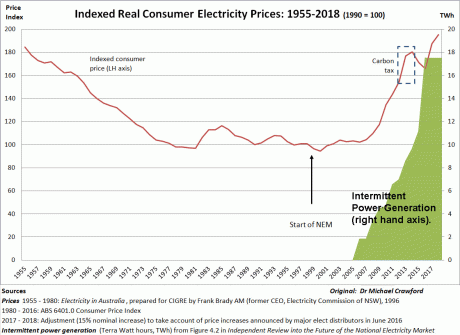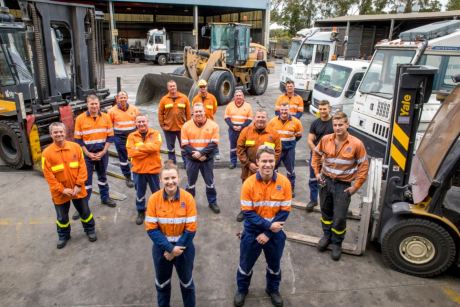Australian power prices went through the roof as a result of its obsession with chaotically intermittent and heavily subsidised wind and solar (see above).
The relationship is so stark, why even a blind man, open to reality, will readily see it. However, no amount of evidence appears to register with those who pretend to govern us.
In the week just gone, Australia’s PM, Scott Morrison confirmed (if there was much doubt?) that he’s off with the fairies, with a commitment to Australia hitting a “net-zero emissions” target by 2050. Central to which is the even wilder and more fantastic claim that the target will be hit by “clean hydrogen”. Whatever on earth that means?
If Scotty from marketing thinks that we’ll soon be converting all of our ‘excess’ wind and solar power into a gas that no industrialised country has managed to tame in any great volume, as the Americans say: “well, good luck with that!”
For a rundown on the nonsensical idea that there is a ‘hydrogen fuelled economy’ just over the horizon, see our posts here and here.
Anyway, back to the destruction wreaked by Australia’s suicidal renewable energy policies, the rocketing power prices those policies have effortlessly delivered are finally being taken seriously by some with the temerity to ask what Australian workers will do when Australia’s manufacturing businesses, mineral processors and miners all finally succumb to the inevitable.
Among our political betters – apart from a handful of Liberals (Australia’s notionally conservative party) – the heavy lifting is being done by National Party backbenchers – with Queensland’s Matt Canavan leading the charge.
The new reality is we need to protect our industries
The Australian
Matt Canavan
26 January 2021
As China has blocked more Australian exports over the past year, we have been implored to trust the international rules-based trading system. That used to mean something. After World War II, countries did sign many international trading agreements that opened up an era of free trade not seen since the 19th century.
However, since China joined the World Trade Organisation the rules of the system have been stretched to breaking point. China has subsidised its industries well beyond what was allowed under the terms of its ascension to the WTO. For example, the Alliance for American Manufacturing estimates 80 per cent of the profits of Chinese steel producers come from government subsidies.
China’s flouting of the rules has caused others to do the same. An increasing array of tariffs and protection have been introduced in response to China’s subsidy-fuelled growth.
Australia has not sought to join this chorus and our manufacturing industry has declined rapidly. Late last year a new record low was reached. There are now fewer than 850,000 people employed in manufacturing, down from more than one million in 2000. The proportion of national economic output from manufacturing is now the second-lowest in the developed world; only Luxembourg has a lower share of its GDP from manufacturing.
During the past 10 years Australia has destroyed its energy competitiveness through over-regulation and renewable energy subsidies. Australia once had one of the lowest power prices in the world; we now have one of the highest. We can’t have high wages and high power prices and expect a strong manufacturing industry as well.
The Nationals believe we should choose lower power prices and support our manufacturing industries against unfair competition again. In the past year I and my Nationals backbench MPs have constructed a nine-point plan to double employment in manufacturing by 2035. Some elements of this plan challenge the long-held belief that Australia should keep the faith with international trading rules. With these rules being increasingly flouted, we believe the nation must respond to the new reality.
We have proposed tasking the Anti-Dumping Commission with investigating the protection and subsidies provided by other countries to the strategic manufacturing industries identified by the federal government. Australia could legally take countervailing measures to protect our industries if we find other countries are unfairly protecting theirs. For example, we could support more domestic steel production so we can become self-sufficient in this area once again — a realistic goal given we are the world’s largest exporter of iron ore and coking coal. We should introduce a Buy Australian Act broadly based on the Buy American Act, and set minimum percentages that must be sourced from domestic manufacturers in government defence and infrastructure projects.
Cheaper energy is a must to rekindle manufacturing jobs. We believe the government should build a coal-fired power station because that remains Australia’s cheapest form of reliable power. We should also expand efforts to find a new oil basin given we produce less than half our raw petroleum needs; 20 years ago we produced more than 90 per cent.
We also believe the government should offer enhanced tax incentives and low-cost finance to manufacturing. Manufacturing investments could be given a depreciation “loading” to offer a greater incentive to take advantage of the instant asset write-off tax changes. Other countries also have low-cost finance options for domestic manufacturing. The government should expand the remit of the Regional Investment Corporation to do the same.
This could give manufacturing businesses the confidence that the government has their back.
As well as supporting investments at home, we will need to develop overseas markets for our goods. The Export Market Development Grants scheme is a successful program but businesses can only access its support once. With the COVID disrupting market relationships, we suggest “resetting the clock” on this scheme so all businesses can apply again and recover from the pandemic.
There is a desperate need to improve skills in manufacturing. We should overhaul our vocational training system to focus more on manufacturing skills and we should harmonise skill requirements so there are no unnecessary restrictions between state borders.
The Nationals team hopes our suggestions will stimulate a serious discussion about what is needed to reboot Australian manufacturing. The Liberal-National government has made manufacturing a priority. To make stuff in Australia again a reality, we have to confront long held truths that might not be suited for modern-day challenges.
The Australian
via STOP THESE THINGS
February 10, 2021 at 12:32AM


